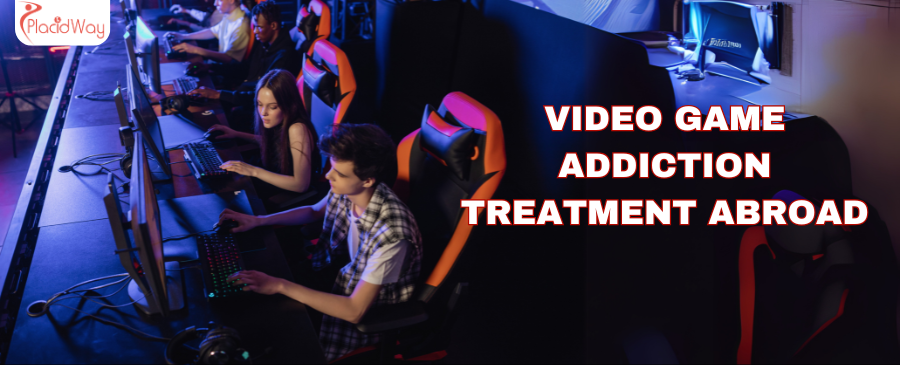
Reclaim Your Life: Effective Video Game Addiction Treatment Abroad
In today's digital age, video games offer immersive entertainment and social connection. However, for some, what starts as a hobby can spiral into a serious health concern known as video game addiction, or Internet Gaming Disorder (IGD). This condition, recognized by the World Health Organization, can profoundly impact an individual's mental health, relationships, academic or professional performance, and overall well-being.
If you or a loved one is struggling with an uncontrollable urge to play video games, experiencing distress when unable to play, or finding that gaming has taken precedence over other life activities, it's a sign that professional help may be needed. The good news is that effective video game addiction treatment is available, and many individuals are finding hope and recovery by seeking specialized care, often in serene and focused environments abroad.
Treatment for gaming disorder focuses on understanding the underlying causes, developing coping mechanisms, and rebuilding a fulfilling life away from screens. This comprehensive approach typically involves a combination of therapy, lifestyle adjustments, and support systems designed to help individuals regain control and rediscover their passions. While local options exist, many families are exploring international treatment centers for their unique benefits, including privacy, diverse therapeutic approaches, and often, more affordable, high-quality care.
This guide will explore everything you need to know about video game addiction treatment, from identifying the symptoms and understanding the causes to exploring various treatment options, what to expect during recovery, and why considering treatment abroad might be the right choice for your journey to wellness.
What are the common signs of video game addiction?
Recognizing the symptoms of video game addiction is the first crucial step toward recovery. It's not just about playing games a lot; it's about the negative impact gaming has on a person's life. Here are the common indicators:
- Preoccupation with Gaming: Constantly thinking about past gaming sessions or anticipating the next one.
- Withdrawal Symptoms: Experiencing irritability, anxiety, sadness, or restlessness when gaming is cut back or stopped.
- Tolerance: Needing to spend increasing amounts of time gaming to achieve the same level of excitement or satisfaction.
- Loss of Control: Unsuccessful attempts to cut down or stop gaming.
- Neglect of Other Activities: Losing interest in former hobbies, social activities, or responsibilities.
- Continued Gaming Despite Consequences: Persisting with gaming even when aware of its negative impact on relationships, school, or work.
- Deception: Lying to family members, therapists, or others about the amount of time spent gaming.
- Using Gaming to Escape: Playing games to relieve negative moods such as guilt, anxiety, or helplessness.
- Jeopardizing Relationships/Opportunities: Risking or losing significant relationships, jobs, or educational opportunities because of gaming.
If these signs resonate with your experience or that of a loved one, it’s important to seek professional evaluation.
What factors contribute to video game addiction?
Video game addiction is a complex issue, rarely stemming from a single cause. It's often a confluence of psychological, social, and biological factors:
- Underlying Mental Health Conditions: Individuals struggling with depression, anxiety, ADHD, or social anxiety may turn to gaming as a coping mechanism or an escape from real-world difficulties.
- Personality Traits: Traits like impulsivity, low self-esteem, perfectionism, or a need for instant gratification can increase vulnerability.
- Social Factors: Loneliness, social isolation, family conflict, or a lack of real-life social support can drive individuals to seek connection and validation within online gaming communities.
- Game Design Elements: Modern video games are designed to be highly engaging, employing sophisticated reward systems (loot boxes, in-game currency), continuous progression, social features (multiplayer, guilds), and unpredictable rewards, which can create a compelling feedback loop that encourages prolonged play.
- Accessibility: The widespread availability of gaming devices (smartphones, consoles, PCs) and internet access makes it easy for individuals to engage in gaming for extended periods.
- Environmental Stressors: Academic pressure, unemployment, or significant life changes can push individuals towards gaming as a form of escapism.
Understanding these contributing factors is essential for developing a personalized and effective treatment plan.
What treatment options are available for gaming disorder?
Treating video game addiction involves a multi-faceted approach, tailored to the individual's specific needs. Common and effective treatment modalities include:
- Cognitive Behavioral Therapy (CBT): This is a cornerstone of addiction treatment. CBT helps individuals identify and challenge distorted thoughts and behaviors related to gaming, replacing them with healthier coping strategies and thought patterns.
- Motivational Interviewing (MI): MI helps individuals explore and resolve ambivalence about change, strengthening their motivation to address their gaming habits.
- Family Therapy: Addiction affects the whole family. Family therapy helps improve communication, address relational issues, and build a supportive home environment conducive to recovery.
- Group Therapy: Connecting with others who share similar struggles can provide immense support, reduce feelings of isolation, and offer valuable perspectives and shared strategies for recovery.
- Medication: While there's no specific medication for gaming addiction itself, medications may be prescribed to manage co-occurring conditions like depression, anxiety, or ADHD, which often underlie compulsive gaming.
- Lifestyle Changes: This includes developing healthy sleep habits, engaging in physical activity, pursuing new hobbies, improving social skills, and setting clear boundaries around screen time.
- Inpatient/Residential Treatment: For severe cases, a residential program offers an immersive, structured, and distraction-free environment, away from triggers, allowing for intensive therapy and skill-building.
The best approach often combines several of these elements to address the individual's unique challenges comprehensively.
Who is eligible for video game addiction treatment?
Eligibility for video game addiction treatment is primarily determined by a professional diagnosis of Internet Gaming Disorder (IGD) or a similar compulsive behavior. Generally, anyone experiencing significant impairment or distress due to their gaming habits can benefit from treatment. This includes:
- Adolescents and Young Adults: This demographic is often more susceptible, given the social and developmental aspects of gaming.
- Adults: While often overlooked, adults can also develop severe gaming addictions that impact their careers, relationships, and health.
- Individuals with Co-occurring Disorders: Those with existing mental health conditions like anxiety, depression, or ADHD are often encouraged to seek integrated treatment for both conditions.
- Families in Distress: Even if the individual isn't fully ready for treatment, family members can seek guidance and support to understand the condition and create a healthier home environment.
A thorough assessment by a mental health professional specializing in addiction will help determine the severity of the addiction and the most appropriate level of care, whether it's outpatient therapy, an intensive outpatient program (IOP), or residential treatment.
What is the typical recovery timeline for gaming addiction?
Recovery from video game addiction is not a one-size-fits-all journey. The timeline can vary significantly based on factors such as the severity of the addiction, the presence of co-occurring conditions, the individual's commitment to change, and the type of treatment received. However, a general trajectory often involves:
- Initial Phase (Weeks 1-4): This phase focuses on detoxification (reducing or stopping gaming), managing withdrawal symptoms, and establishing a stable environment. Intensive therapy begins, focusing on immediate coping strategies and understanding the addiction.
- Intermediate Phase (Months 2-6): The focus shifts to deeper therapeutic work, addressing underlying issues, developing relapse prevention strategies, and building healthy lifestyle habits. This includes individual and group therapy, family counseling, and vocational or academic planning.
- Long-Term Recovery (6+ Months to Ongoing): This is a continuous process of maintaining progress, integrating new skills into daily life, and seeking ongoing support through therapy, support groups, and a healthy routine. Relapses can occur, but they are viewed as learning opportunities rather than failures.
It's important to remember that recovery is a marathon, not a sprint. Patience, persistence, and a strong support system are key.
Are there any risks or side effects of video game addiction treatment?
Video game addiction treatment is generally safe and beneficial, but like any significant life change, it can come with its own set of challenges and temporary side effects:
- Emotional Distress: As individuals confront underlying issues and uncomfortable emotions that gaming once masked, they may experience temporary sadness, anger, or anxiety during therapy.
- Withdrawal Symptoms: During the initial reduction or cessation of gaming, individuals might experience irritability, restlessness, sleep disturbances, or intense cravings. These symptoms usually subside within a few days to weeks.
- Difficulty Adapting: Transitioning to a life without compulsive gaming can be challenging. Individuals may struggle to find new hobbies, build social connections, or cope with boredom initially.
- Family Dynamics: Family therapy can sometimes bring pre-existing tensions to the surface, though this is ultimately aimed at healthier resolution.
- Relapse Potential: The risk of relapse is always present in addiction recovery. It's not a failure but a part of the learning process, requiring reassessment of strategies.
These potential challenges are typically managed within the supportive framework of a professional treatment program, with therapists guiding individuals through these transitions.
How much does video game addiction treatment cost globally?
The cost of video game addiction treatment can vary widely, making it a significant consideration for many families. Factors influencing the price include the type of program (outpatient vs. inpatient), the duration of treatment, the location, the facility's amenities, and the level of personalized care. Here's a general overview of global cost comparisons:
Video Game Addiction Treatment Cost Comparison (Estimate per month)
| Country | Outpatient Therapy (per session) | Residential Treatment (per month) | Key Value Proposition |
|---|---|---|---|
| United States | $150 - $300 | $15,000 - $40,000+ | Highly specialized care, but often highest cost. |
| United Kingdom | £80 - £150 ($100-$190) | £8,000 - £20,000+ ($10,000-$25,000+) | Quality care, but still premium pricing. |
| Thailand | $50 - $100 | $5,000 - $15,000 | Serene environment, holistic approach, significantly lower cost. |
| Mexico | $70 - $150 | $6,000 - $18,000 | Proximity for North Americans, good value, comprehensive programs. |
| Europe (e.g., Spain, Portugal) | €70 - €120 ($75-$130) | €7,000 - €18,000 ($7,500-$19,000) | High-quality, often luxurious facilities, competitive pricing compared to US/UK. |
These figures are estimates and can fluctuate. It's crucial to get detailed quotes from specific clinics and understand what is included in the package (accommodation, therapy sessions, meals, activities, aftercare).
Why consider video game addiction treatment abroad?
For many, seeking treatment for video game addiction abroad offers distinct advantages:
- Escape from Triggers: A new environment removes the individual from their usual gaming setup, peer groups, and daily stressors that fuel the addiction, allowing for a complete focus on recovery.
- Enhanced Privacy: Traveling abroad can offer a level of anonymity and discretion that might not be possible locally, which can be crucial for public figures or those who value privacy.
- Cost-Effectiveness: As seen in the cost comparison, many countries offer world-class treatment facilities at a fraction of the cost found in Western countries, without compromising on quality.
- Access to Specialized Programs: Some international clinics specialize specifically in gaming and internet addiction, offering unique programs and therapies that might not be readily available domestically.
- Holistic and Immersive Experience: Many foreign centers integrate wellness activities, cultural experiences, and natural surroundings into their programs, providing a holistic healing environment.
- Reduced Wait Times: In some regions, booking into a high-quality program abroad might involve shorter wait times compared to popular domestic facilities.
The change of scenery itself can be therapeutic, offering a fresh perspective and a tangible break from old habits.
Which countries offer the best value for gaming addiction treatment?
When considering value, a balance between cost, quality of care, and overall experience is key. Several countries stand out for offering excellent gaming addiction treatment at competitive prices:
- Thailand: Known for its serene environment, compassionate care, and holistic wellness approaches, Thailand has several reputable addiction treatment centers that specialize in digital dependencies. The cost of living is lower, making comprehensive residential programs more accessible.
- Mexico: With its proximity to the United States and Canada, Mexico offers convenient travel along with high-quality, often luxurious, treatment facilities at a fraction of the cost. Many clinics provide bilingual staff and culturally sensitive care.
- Portugal & Spain: These European countries are gaining recognition for their modern addiction treatment centers, often located in beautiful, tranquil settings. They offer experienced therapists, diverse therapeutic modalities, and a high standard of medical care, with prices generally more favorable than Northern Europe or the US.
- Malaysia & Bali (Indonesia): Emerging as popular destinations, these regions offer lush, private settings with a focus on holistic healing, combining traditional therapies with modern psychological approaches.
When choosing, research specific clinics, read patient testimonials, and ensure their approach aligns with your needs.
What should I expect when traveling for this procedure?
Traveling abroad for video game addiction treatment involves a structured process to ensure a smooth and effective recovery journey:
- Pre-Departure Planning:
- Initial Consultation: Connect with PlacidWay to discuss your needs, receive recommendations for clinics, and get detailed quotes.
- Medical Assessment: The chosen clinic will typically conduct a remote assessment (video call, questionnaires) to understand the individual's history, severity of addiction, and any co-occurring conditions.
- Logistics: Arrange passports, visas, flights, and travel insurance. The clinic or medical tourism facilitator often assists with these arrangements.
- Packing: Prepare for an extended stay, keeping in mind the clinic's rules regarding electronics and personal items.
- Arrival and Orientation:
- Airport Transfer: Many clinics offer airport pick-up services.
- On-Site Assessment: A more thorough physical and psychological assessment upon arrival to finalize the treatment plan.
- Settling In: Get acquainted with the facility, staff, and other residents.
- Treatment Program:
- Structured Schedule: Expect a daily routine filled with individual therapy, group sessions, educational workshops, recreational activities, and perhaps mindfulness or fitness programs.
- Therapeutic Environment: The focus will be entirely on recovery, away from distractions and triggers.
- Communication: Limited or no access to electronics is common, with structured times for family communication.
- Aftercare Planning: Before discharge, the clinic will work with you to develop a robust aftercare plan, which may include follow-up therapy, support groups, and strategies for reintegration into daily life.
This immersive experience is designed to provide maximum benefit and a strong foundation for lasting recovery.
How can I ensure safety and quality when seeking treatment abroad?
Ensuring safety and quality when seeking treatment abroad is paramount. Here's how to do it:
- Accreditation and Licensing: Look for international accreditations such as Joint Commission International (JCI), which signifies adherence to high standards of patient care and safety. Also, verify local government licensing.
- Staff Qualifications: Confirm that therapists, counselors, and medical staff are licensed, experienced, and specialize in addiction treatment, particularly digital addictions. Ask about their educational background and certifications.
- Treatment Philosophy and Approach: Ensure the clinic's treatment model aligns with evidence-based practices (e.g., CBT, motivational interviewing) and resonates with your values.
- Patient Testimonials and Reviews: Research independent reviews and ask the clinic for references from previous international patients. Look for consistent positive feedback.
- Transparency in Pricing: Get a clear, all-inclusive quote to avoid hidden costs. Understand what services are included (therapy, accommodation, meals, activities, aftercare).
- Aftercare Planning: A quality program will have a robust aftercare plan. Discuss how they support continued recovery once you return home.
- Consult a Medical Tourism Facilitator: Reputable facilitators like PlacidWay specialize in vetting clinics, understanding international standards, and assisting with all aspects of your journey, providing an added layer of security and expertise.
- Communication: Ensure clear communication channels with the clinic and its staff, preferably in your native language or a language you are comfortable with.
Thorough due diligence can help you make an informed and confident decision.
What are patient success stories from abroad for gaming addiction?
While specific names and details are protected by patient confidentiality, many international clinics share anonymized success stories that highlight the profound positive impact of their programs. Common themes among these success stories include:
- A Fresh Start: Patients often speak of the immense benefit of being completely removed from their triggering environment, allowing them to truly reset and focus on self-improvement. "The distance helped me realize how much gaming controlled my life back home," one patient might say.
- Rediscovering Purpose: Many report finding new hobbies, reigniting old passions, and developing a renewed sense of purpose outside of gaming. "I picked up painting again, something I hadn't touched in years because of gaming," another might share.
- Improved Relationships: Healing extends to family and friends. Patients often share how their relationships have mended and strengthened after treatment, with better communication and trust.
- Better Mental Health: A significant portion of success stories highlight reduced anxiety, depression, and increased self-esteem, as underlying issues are addressed and healthy coping mechanisms are learned. "My anxiety attacks disappeared, and I finally felt like myself again," a former patient might express.
- Sustainable Lifestyle Changes: The immersive nature of residential treatment abroad often instills lasting habits related to sleep, nutrition, exercise, and social engagement, leading to a more balanced life post-treatment.
These narratives underscore that recovery is not just about stopping gaming, but about building a more fulfilling and healthier life.
Take the Next Step with PlacidWay
Ready to explore treatment options abroad? Discover top clinics, compare prices, and get a free quote tailored to your needs with PlacidWay.





.png)
.png)



Share this listing